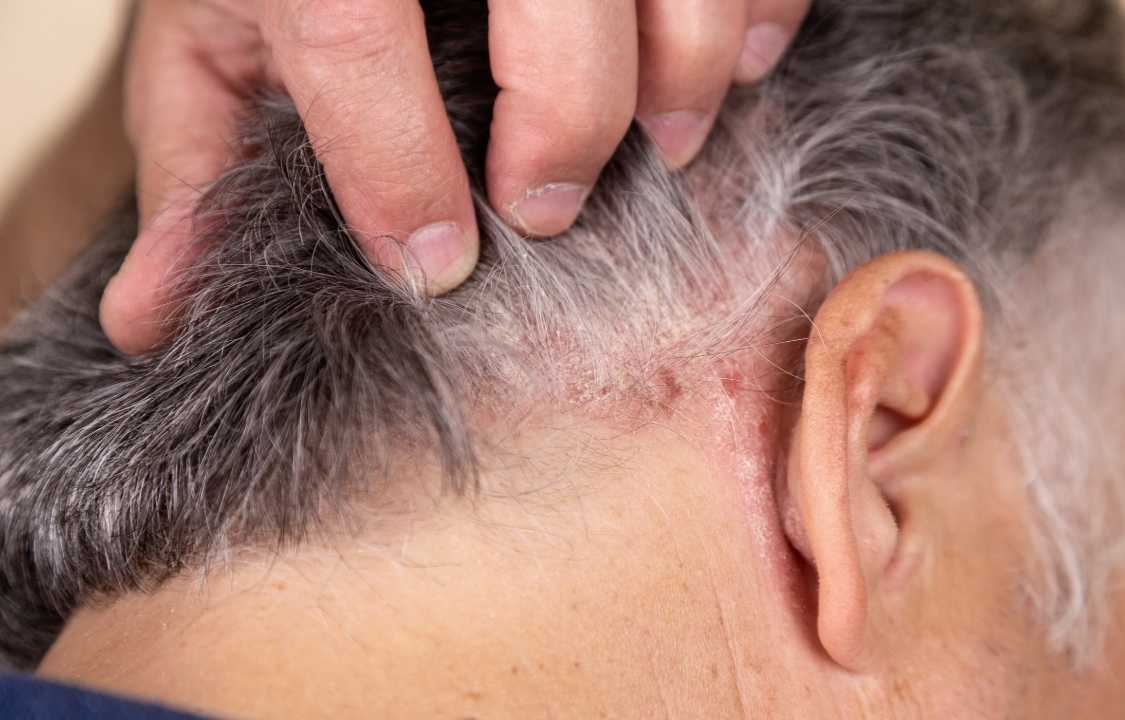Chronic, Disease, Health Care, Insight
4 Things To Know About Scalp Psoriasis, According To Dermatologists
It can look a lot like dandruff, for one.
Psoriasis is a chronic skin condition that affects millions of people worldwide. While it can manifest anywhere on the body, scalp psoriasis specifically targets the skin on the scalp. This condition, characterized by itchy, sore patches of thick, red skin with silvery scales, is a result of immune system dysfunction. Unlike communicable diseases, psoriasis cannot be transmitted from person to person. Instead, it arises from an accelerated skin cell turnover process, where skin cells rapidly rise to the surface over a few days, leading to the formation of thick, scaly patches. The distinct characteristics of scalp psoriasis stem from the unique properties of the scalp’s skin, which is thicker than skin elsewhere on the body and is often covered by hair.
In this comprehensive guide, we will explore the nuances of scalp psoriasis, discussing its prevalence, symptoms, potential complications, and various treatment options available to manage the condition effectively. Understanding these aspects is essential for individuals dealing with scalp psoriasis, as it can significantly impact their quality of life and overall well-being.
Prevalence of Scalp Psoriasis
Scalp psoriasis is a relatively common subtype of psoriasis among individuals with the condition. Psoriasis, in general, affects more than eight million Americans, according to data from the National Psoriasis Foundation (NPF). Remarkably, nearly 80 percent of individuals with psoriasis will experience scalp psoriasis at some point in their lives.
Conversely, some individuals may exclusively have scalp psoriasis without it affecting other areas of their skin. The severity of scalp psoriasis can vary, ranging from mild, with fine scaling, to severe, characterized by thick crusted plaques. Moreover, scalp psoriasis can extend beyond the scalp itself, affecting areas such as the forehead, the back of the neck, and the skin around the ears.
Distinguishing Scalp Psoriasis from Dandruff
Scalp psoriasis and dandruff may share some similarities in appearance, but they are distinct conditions with different causes and treatment approaches. It is crucial to differentiate between the two for effective management:
1. Scalp Psoriasis:
- Displays silvery scales and well-defined red, raised plaques.
- Accompanied by itching, similar to the itching associated with dandruff.
- Requires specialized treatment to address the underlying immune system dysfunction and reduce skin cell turnover.
2. Dandruff:
- Characterized by flaking and dryness of the scalp.
- Often accompanied by mild itching.
- Typically managed with over-the-counter anti-dandruff shampoos and proper scalp hygiene.
While the scales from scalp psoriasis may flake off like dandruff, the conditions demand distinct treatment strategies tailored to their respective causes.
Hair Loss and Scalp Psoriasis
Hair loss is a potential complication associated with scalp psoriasis, as indicated by the National Psoriasis Foundation (NPF). However, it is essential to understand that hair loss primarily results from damage to the hair shaft and hair follicles. This damage can occur due to excessive itching, rubbing, and combing of the affected areas, or even from the ingredients in hair care products used during flare-ups.
The encouraging news is that hair loss linked to scalp psoriasis is typically temporary. With appropriate treatment and effective management of psoriasis, normal hair growth can be restored once the condition is under control. Preventing excessive itching and damage to the scalp is key to minimizing hair loss associated with scalp psoriasis.
Treatment Options for Scalp Psoriasis
When seeking treatment for scalp psoriasis, individuals have various options to consider. The choice of treatment depends on the extent of the condition, its impact on daily life, and whether it is localized to the scalp or present on other parts of the body. Here are some common treatment approaches:
1. Topical Treatments:
- Corticosteroids are often prescribed as foams, shampoos, creams, gels, or lotions and can effectively control scalp psoriasis within two to four weeks.
- Topical calcipotriene, a synthetic form of vitamin D, can help maintain scalp health.
- Coal tar and salicylic acid-containing shampoos can be used to alleviate symptoms.
2. Phototherapy:
- Phototherapy involves using a UV comb to deliver light directly to the scalp.
- Light therapy has been a longstanding treatment for psoriasis, as it reduces inflammatory cells in the skin.
- However, this therapy may require multiple sessions per week over several weeks, necessitating visits to a healthcare provider.
3. Systemic Medications:
- Systemic medications work by modulating the immune system to control psoriasis internally.
- They are particularly beneficial for individuals with widespread psoriasis that affects multiple areas of the body, including the scalp.
It is crucial for individuals with scalp psoriasis to consult with healthcare providers to determine the most suitable treatment plan. Additionally, it is essential to acknowledge the role of stress in exacerbating psoriasis symptoms. Managing stress can be an integral part of controlling flare-ups and improving overall well-being.
Conclusion
Scalp psoriasis is a prevalent manifestation of the chronic skin condition psoriasis, affecting a substantial number of people grappling with this ailment. Comprehending the distinctive attributes of scalp psoriasis, potential complications it may entail, and the array of treatment alternatives available is of utmost importance in effectively dealing with this condition and enhancing one’s overall quality of life.
It’s crucial to acknowledge that while scalp psoriasis can be emotionally distressing, proper care and treatment can significantly alleviate its associated symptoms, and hair loss, in most cases, can be reversed. Seeking guidance from healthcare professionals and addressing the root cause, which often lies in the immune system dysfunction, are pivotal steps toward achieving successful management and relief.
Moreover, aside from medical interventions, individuals afflicted by scalp psoriasis can derive substantial benefits from adopting stress management techniques, as stress has been shown to have a direct correlation with exacerbating flare-ups of the condition. By adopting a holistic approach to managing scalp psoriasis, individuals can regain control over their condition and ultimately savor a better quality of life.

